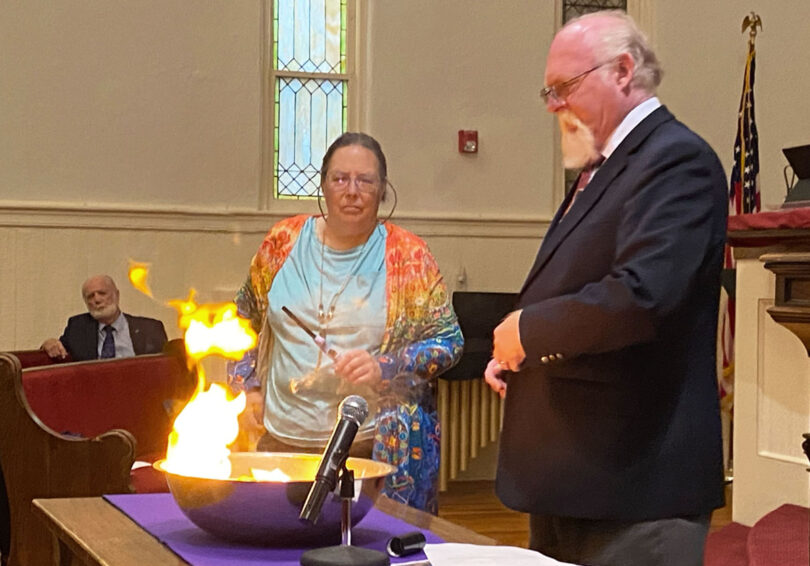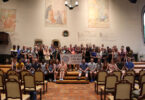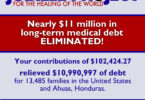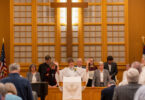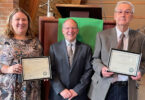Who would think that you could buy medical debt for a penny on the dollar? It’s crazy. But Trinity Moravian Church has done it – and is going to keep doing it!
Medical debt is a major issue in our country. Most bankruptcies are the result of medical debt, and today, nearly 1 in 4 families owe medical debt they cannot immediately pay. Many of the folks we have helped in an emergency— paying a fuel bill in the winter or a water bill when the water is going to be shut off—had a back story that involved a hospital stay and medical debt. As a pastor, I heard more and more stories from all quarters—people with medical insurance, people without. It has been a growing concern.
A couple of years before the pandemic, I heard of RIP Medical Debt, a nonprofit established for the sole purpose of reducing the medical debt burdens of low-income individuals with limited capacity to pay their medical bills. This charity was organized in 2014 by Craig Antico and Jerry Ashton, both of whom were career debt collection executives. They knew every detail of how the debt collection industry worked, and came up with the brilliant idea of flipping the system to forgive debts rather than collecting them.
A debt forgiveness effort 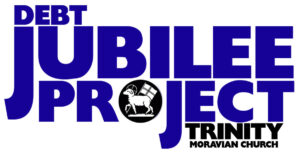
In early 2022, at our annual planning retreat, I asked the Trinity Moravian Church board if we should pursue a project of buying and forgiving medical debts in our area. The board members unanimously supported of the idea, and so we contacted RIP Medical Debt to find out how we could work with them. The end result? We arranged to undertake a campaign to raise $5,000 cash to purchase the approximately $500,000 in medical debt that was for sale at that time in our home county of Forsyth in North Carolina. This seemed an ambitious goal coming out of Covid, but generosity to help those in need runs deep in the Trinity DNA, and we felt like we could manage it. We planned the campaign for three months. We named the campaign the “Debt Jubilee Project,” based on the Year of Jubilee spelled out in Deuteronomy 15, when debts would be forgiven and slaves freed.
The results were astonishing. We hit the goal in less than six weeks, mostly with small donations of $25 or $50. The word of mouth was amazing: not only did Trinity members give, but so did their friends and coworkers when they heard of the campaign. Everyone was deeply interested, and often had their own story to tell about wrestling with medical debts. We closed the campaign on September 15, and a couple of weeks later we received the staggering news that our paltry $5,275.42 was able to purchase $1,165,796.61 of debt owed by people in Davidson and Forsyth counties. 1,356 families received a letter out of the blue informing them that their medical debt had been purchased and forgiven.
To celebrate, we decided to have a “debt burning” during one of our services, much like an old-fashioned mortgage burning. Though we do not know the names of the debtors we had helped, we created a list with their debtor numbers and burned the list during our service on September 25, while singing “Sing Hallelujah, Praise the Lord.” Our members were inspired and amazed to learn how much our modest congregation had been able to do. June Edwards, vice-chair of the board, told the local newspaper that it seemed like a “loaves and fishes” miracle. For the recipient families, it certainly seemed like a perfect parable for how God forgives our debts!
A second campaign
 With the wind at our back, and a strong feeling that God had blessed this venture of faith, we decided to go again! There was a large amount of back medical debt for sale in neighboring Davidson County, where a number of our members live. So we decided to go ahead with a campaign to raise $15,000 in December and January. We left the starting block immediately with a $2,500 grant from the Moravian Ministries Foundation and an anonymous gift of $3,000. I spent the two months speaking to many groups about the effort; our members talked to friends in other churches and organizations. Once again, the small donations came in, this time from a wider range and people we’d never heard of.
With the wind at our back, and a strong feeling that God had blessed this venture of faith, we decided to go again! There was a large amount of back medical debt for sale in neighboring Davidson County, where a number of our members live. So we decided to go ahead with a campaign to raise $15,000 in December and January. We left the starting block immediately with a $2,500 grant from the Moravian Ministries Foundation and an anonymous gift of $3,000. I spent the two months speaking to many groups about the effort; our members talked to friends in other churches and organizations. Once again, the small donations came in, this time from a wider range and people we’d never heard of.
We closed the campaign on January 31 with $15,047.97. A couple of weeks later we received the happy news that RIP Medical Debt had been able to purchase $3,296,863.64 of medical debts, and forgiveness letters went out to 3,355 families in Davidson, Davie, and Yadkin counties. To help people understand the mind-numbing size of the debts we had purchased, we calculated that if you laid 3,296,863 dollar bills end-to-end, they would reach from the steps of Trinity to the steps of the US Capitol, 336 miles away.
Needless to say, we had another “debt burning!” During our service on March 26, we burned a list of the 3,355 forgiven debts while bells rang, confetti flew, and all three verses of “Sing Hallelujah” raised the roof. But this time, the word had gotten out and the event was covered by the local television station, WXII-12, and the Davidson county newspaper, The Lexington Dispatch. The TV station did a great story; we were all very excited, and we began to prepare for “round three.”
Success goes viral
But nothing prepared us for what happened next. A couple of weeks later, I got up one Tuesday morning to a message from another Moravian pastor – “You guys made the top page of Reddit!” As the day wore on, emails from all over poured in – “Debt Jubilee is trending on Twitter,” “It’s the top shared story on TikTok!” Just like the Covid virus (but in a better way!) the story had gone truly viral – shared by one person after another until it was simply everywhere. I laughed at one comment on Reddit, one poster said, “I think this is great, but this is the hundredth time I’ve seen it on my feed today and I’m tired of it!” Calls and emails from relatives and friends all over the country poured in.
The next day it went further. The Jubilee became a story on several nationally syndicated radio talk shows, including The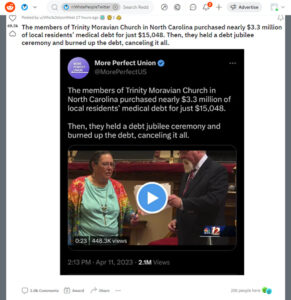 Glenn Beck Show, where Beck said “This is the best thing I’ve ever heard of.” Then on April 26, CNN picked up the story and for a while it was on the front page of CNN.com. Since then, we’ve had media inquiries from Time Magazine, The Independent in the UK, and Réforme in France. Deutsche Welle wants to come and cover the next debt burning! The intense interest in this story has been simply amazing. Obviously we hit a nerve on an issue that is felt across many boundaries.
Glenn Beck Show, where Beck said “This is the best thing I’ve ever heard of.” Then on April 26, CNN picked up the story and for a while it was on the front page of CNN.com. Since then, we’ve had media inquiries from Time Magazine, The Independent in the UK, and Réforme in France. Deutsche Welle wants to come and cover the next debt burning! The intense interest in this story has been simply amazing. Obviously we hit a nerve on an issue that is felt across many boundaries.
We have had calls, emails, and letters from all over the country, many asking how other churches can get involved. A great many responses come from “dones,” people who have left the church wounded. The theme of these is “this is exactly what churches should do.” But sadly, the responses also reveal how negatively organized religion is perceived: “Finally, a church doing something positive.” “Thank you for doing something truly Christlike in a world packed with Pharisees.” My favorite was from Carol M. in Iowa: “Joel Osteen might have a plane and a mansion but you are the real MEGA church!”
We’ve just launched our third campaign, and this one will go very quickly because of the many other churches that have stepped up to support the project. We invite any churches in the North Carolina Triad area to join in one of our future projects, which we hope will grow as we talk to local hospitals about releasing more of the debt they hold.
And we challenge Moravian congregations everywhere to join in – find an existing campaign in your area to support. If there isn’t an existing campaign, partner up with some other churches in your area (Moravian or not) and start one the way we did!
The Rev John Jackman is pastor of Trinity Moravian Church in Winston-Salem, N.C.
Rev. Rebecca Craver, director of the Southern Province Commission on Congregational Development, interviewed Rev. Jackman about Trinity’s initiative.
How does medical debt forgiveness work?
So how does it work? Anyone who has had a family member hospitalized knows the reams of bills and insurance statements that come – often baffling and confusing even for the most educated. Even if you have good insurance, there is often a balance you must pay – or a staggering surprise bill for something you didn’t know was out of network. If you don’t pay that balance promptly, the clock starts ticking. After a few months of non-payment, the creditor will often engage a debt collection agency to contact the debtor and seek payment.
When debts, whether medical or otherwise, have aged to a certain point without payment (even after traditional debt collection), creditors in many cases will sell the debt off to a third-party collection agency, which purchases the debt at a steep discount. The third party then has the legal right to collect the full amount of the debt even though they only paid pennies on the dollar for it. This is known as “factoring.”
This is where RIP Medical Debt steps in. They can bid on large portfolios of medical debt in the same way a third-party collection agency can, often buying the debt at a staggering discount, often less than a penny on the dollar. However, in this case, they use donated money to purchase the debt – and forgive it rather than collecting on it. The debts they bid on must meet strict standards – the household income must be less than four times the federal poverty level, or the debt is 5 percent or more of the annual household income.
Learn more at debtjubileeproject.org and ripmedicaldebt.org

